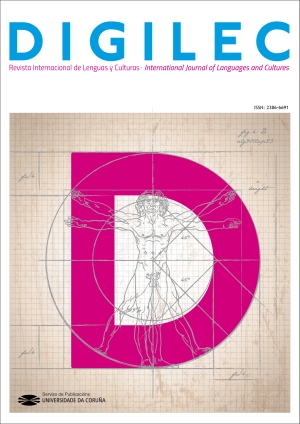Through the looking glass: benefits of the lesson study for compulsory education teachers and students
Main Article Content
Abstract
The literature on cooperative learning is unanimous in the advantages it offers for the development of essential skills for the 21st century citizen. Lesson Studies (LS) are “not only a means of improving the skills and knowledge of teachers, but also a way to improve the knowledge base of the teaching profession” (Stigler, 2004: ix). The two main objectives of this study are: i. To analyse and compare the impact of two rounds of LS implementation (175 students) in the framework of the project Dispositifs Inclusifs de Cooperation - DICO+ (2018-1-FR01-KA201-047904); and ii. To analyse the impact on training of LS among teaching staff. The Mixed Methods Research approach was used for this analysis. The quantitative results of this study revealed interesting comparisons of students’ preferences when working under the LS paradigm, while the qualitative data indicate that the LS has contributed significantly to the improvement of teachers’ training and teaching practice. Our conclusions indicate that students recognize the social benefits of the implementation of the LS, and suggest that teachers should learn more about and implement the LS more often, because structuring cooperative work prior to implementation benefits learning (Sulfemi & Kamalia, 2020) and can contribute to improving teachers’ training (both pre- and in-service), as well as their readiness to adopt adaptive techniques in the classroom.
Keywords:
Downloads
Article Details
References
Cajkler, W., Wood, P., Norton, J., & Pedder, D. (2013). Lesson study: towards a collaborative approach to learning in initial teacher education?. Cambridge Journal of Education, 43(4), 537–554. https://doi.org/10.1080/0305764x.2013.834037.
Campo-Arias, A., & Oviedo, H. C. (2008). Psychometric properties of a scale: Internal consistency. Revista de salud pública, 10(5), 831–839. https://doi.org/10.1590/s0124-00642008000500015.
Creswell, J. W., & Poth, C. N. (Eds.). (2018). Qualitative inquiry and research design. Choosing among five traditions (4th ed.). Londres: SAGE.
Decker, W. H., Calo, T. J., Yao, H., & Weer, C. H. (2015). Preference for group work in China and the US. Cross Cultural Management, 22(1), 90–115. https://doi.org/10.1108/CCM-03-2013-0053.
Dzemidzic Kristiansen, S. (2020). Exploring pupils’ and teachers’ perspectives on face-to-face promotive interaction in cooperative learning. Education, 3(13), 1–16. https://doi.org/10.1080/03004279.2020.1833060.
Estrella, S., Zakaryan, D., Olfos, R., & Espinoza, G. (2019). How teachers learn to maintain the cognitive demand of tasks through Lesson Study. Journal of Mathematics Teacher Education, 23, 293–310. https://doi.org/10.1007/s10857-018-09423-y.
Evans, T., Klymchuk, S., Murphy, P. E., Novak, J., Stephens, J., & Thomas, M. (2020). Engagement of undergraduate STEM students: the influence of non-routine problems. Higher Education Research & Development, 1–17. https://doi.org/10.1080/07294360.2020.1835838.
Guner, P., & Akyuz, D. (2020). Noticing Student Mathematical Thinking within the Context of Lesson Study. Journal of Teacher Education, 71(5), 568–583. https://doi.org/10.1177/0022487119892964.
Hasan, R. M., Lukitasari, M., & Ernawati, Y. (2021). Students’ achievement and teachers’ perception in the implementation of lesson study-based cooperative learning. Journal of Physics: Conference Series 1731 012004. https://doi.org/10.1088/1742-6596/1731/1/012004. https://cutt.ly/XbEu0SH.
Johnson, D. W., & Johnson, R. T. (2002). Cooperative learning and social interdependence theory. En R. Scott Tindale et al. (Eds.), Theory and research on small groups, 9–35. Springer.
Kyprianidou, M., Demetriadis, S., Tsiatsos, T., & Pombortsis, A. (2012). Group formation based on learning styles: can it improve students’ teamwork?. Educational Technology Research and Development, 60(1), 83–110. https://doi.org/10.1007/s11423-011-9215-4.
Lenski, S. J., & Caskey, M. M. (2009). Using the Lesson Study Approach to Plan for Student Learning. Middle School Journal, 40(3), 50–57. https://doi.org/10.1080/00940771.2009.11495587.
Peña-Trapero, N., & Pérez-Gómez, A. I. (2017). Pedagogical potentialities of lesson study for the reconstruction of teachers’ dispositions. International Journal for Lesson and Learning Studies, 6(1), 66-79. https://doi.org/10.1108/IJLLS-09-2016-0029.
Perry, R. R. & Lewis, C. C. (2009). What is successful adaptation of lesson study in the US? Journal of Educational Change, 10, 365–391. https://doi.org/10.1007/s10833-008-9069-7.
Schipper, T. M., van der Lans, R. M., de Vries, S., Goei, S. L., & van Veen, K. (2020). Becoming a more adaptive teacher through collaborating in Lesson Study? Examining the influence of Lesson Study on teachers’ adaptive teaching practices in mainstream secondary education. Teaching and Teacher Education, 88, 102961. https://doi.org/10.1016/j.tate.2019.102961.
Shaw, J. D., Duffy, M. K., & Stark, E. M. (2000). Interdependence and preference for group work: Main and congruence effects on the satisfaction and performance of group members. Journal of Management, 26(2), 259–279. https://doi.org/10.1177/014920630002600205.
Shi, W., & Han, L. (2019). Promoting Learner Autonomy through Cooperative Learning. English Language Teaching, 12(8), 30–36. https://doi.org/10.5539/elt.v12n8p30.
Stark, E. M., Shaw, J. D., & Duffy, M. K. (2007). Preference for group work, winning orientation, and social loafing behavior in groups. Group & Organization Management, 32(6), 699–723.
https://doi.org/10.1177/1059601106291130.
Stigler, J. W. (2004). Foreword. En C. Fernández & M. Yoshida (Eds.), Lesson Study. A Japanese Approach to Improving Mathematics Teaching and Learning, ix–xi. Lawrence Erlbaum Associates.
Sulfemi, W. B., & Kamalia, Y. (2020). Jigsaw Cooperative Learning Model Using Audiovisual Media to Improve Learning Outcomes. JPsd (Jurnal Pendidikan Sekolah Dasar), 6(1), 30–42.
https://jurnal.untirta.ac.id/index.php/jpsd/article/viewFile/4919/5063.
Uştuk, Ö., & De Costa, P. I. (2020). Reflection as meta‐action: Lesson study and EFL teacher professional development. TESOL Journal, e531. https://doi.org/10.1002/tesj.531. https://cutt.ly/4bEt9LA
Wahyukti, T. (2017, October). Enhancing Students' Cooperative Learning in an EFL Classroom through Lesson Study. En 4th Asia Pacific Education Conference (AECON 2017, 283–287. Atlantis Press.
Widita, A., & Nurihsan, A. J. (2020). The Development of Internalization of Character Responsibility through the Cooperative Learning Model on Students in Elementary School. International Conference on Elementary Education, 2(1), 387–394. http://proceedings.upi.edu/index.php/icee/article/view/640/555.
Wood, P., & Cajkler, W. (2018). Lesson study: A collaborative approach to scholarship for teaching and learning in higher education. Journal of Further and Higher Education, 42, 313–326. https://doi.org/10.1080/0309877X.2016.1261093.


